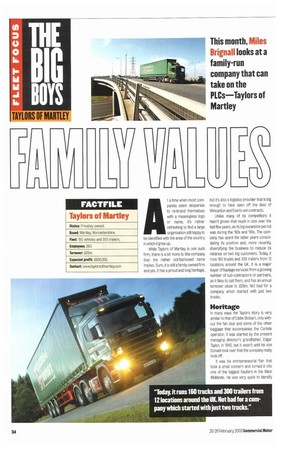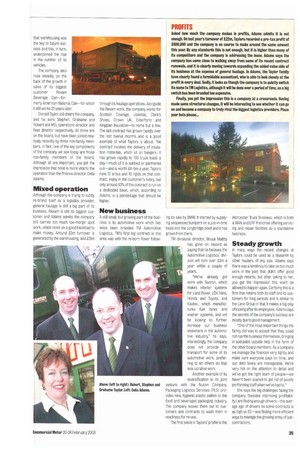A t a time when most companies seem desperate to re-brand
Page 34

Page 35

If you've noticed an error in this article please click here to report it so we can fix it.
themselves with a meaningless logo or name, its rather refreshing to find a large organisation still happy to be identified with the area of the country in which it grew up.
While Taylors of Martley is one such firm, there is a bit more to this company than the rather old-fashioned name implies. Sure, it is still a family-owned firm and yes, it has a proud and long heritage, but it's also a logistics provider that is big enough to have seen off the likes of Wincanton and Exel to win contracts.
Unlike many of its competitors it hasn't grown that much in size over the last few years, as its big expansion period was during the 'BOs and '90s. The company has spent the latter years consolidating
its position and, more recently diversifying the business to reduce its reliance on two big customers. Today, it runs 160 trucks and 300 trailers from 12 locations around the UK. It is a major buyer of haulage services from a growing number of sub-contractors or partners, as it likes to call them, and has an annual turnover close to 125m. Not bad for a company which started with just two trucks.
Heritage
In many ways the Taylors story is very similar to that of Eddie Stobart, only without the fan club and some of the other baggage that accompanies the Carlisle operator. It was started by the present managing director's grandfather, Edgar Taylor, in 1940, but it wasn't until his son Donald took over that the company really took off.
It was his entrepreneurial flair that took a small concern and turned it into one of the biggest hauliers in the West Midlands. He was very quick to identify that warehousing was the key to future success and this, in turn, underpinned the rise in the number of its vehicles.
The company also rose steadily on the back of the growth in sales of its biggest customer Rexam Beverage Can—formerly American National Can—for which it still works 25 years later.
Donald Taylor still chairs the company, and his sons Stephen, Grahame and Robert are MD, operations director and fleet director respectively. All three are on the board, but have been joined relatively recently by three non-family members. In fact, one of the key components of the company we see today are those non-family members of the board. Although all are important, you get the impression that none is more vital to the operation than the finance director Celia Adams.
Mixed operation
Although the company is trying to subtly re-brand itself as a logistics provider, general haulage is still a big part of its business. Rexam is still its biggest customer and Adams admits the company still carries too much low-margin spot work, which relies on a good backload to make money. Around £5m turnover is generated by the warehousing, and £15m through its haulage operations. Alongside the Rexam work, the company works for Scottish Courage, Licential, Clark's Shoes. Crown UK, Esterform and Kingplan Insulation—to name but a few. The last contract has grown rapidly over the last twelve months and is a good example of what Taylors is about. The contract involves the delivery of insulation materials, which sit on hangers. It has grown rapidly to 100 truck loads a day—much of it is subbed or partnered out—and is worth £4-5m a year. Taylors runs 12 artics and 10 rigids on that contract, many in the customer's livery, but only around 60% of the contract is run on a dedicated basis, which, according to Adams, is a percentage that should be higher.
New business
A still small, but growing part of the business is its automotive work which has since been branded TM Automotive Logistics. TM's first big contract in this area was with the re-born Rover follow ing its sale by BMW. ft started by supplying sequenced bumpers on a just-in-time basis into the Longbridge plant and it has grown from there.
TM divisional director, Bruce Maltby has gone on record as saying that he believes the Automotive Logistics' division will turn over 2,5m a year within a couple of years.
"We've already got work with Textron, which makes interior systems for Land Rover, LDV Vans, Honda and Toyota, and Kautex, which manufactures fuel tanks and washer systems, and will be looking to further increase our business elsewhere in the automotive industry," he says. Interestingly, the company does not provide the transport for some of its automotive work, preferring to let others do that less lucrative work.
Another example of its diversification is its joint venture with the Nucon Company. Packaging Logistics Services (PLS) provides new, hygienic plastic pallets to the food and beverages packaging industry The company leases them out to customers and contracts to wash them in readiness for re-use.
The final piece in Taylors' profile is the Worcester Truck Business, which is both a MAN and ERF franchise offering servicing and repair facilities as a standalone business.
Steady growth
In many ways the recent changes at Taylor's could be used as a blueprint by other hauliers of any size. Adams says there was a tendency to take on too much work in the past that didn't offer good enough returns, but after talking to her. you get the impression this won't be allowed to happen again. Certainly this is a firm that retains both its staff and its customers for long periods and is similar to the Lane Group in that it makes a big play of looking after its employees. Adams says the secrets of the company's success are masts, due to good management.
"One of the most important things the family did was to accept that they could not run the business themselves, bringing in specialist outside help in the form of the other board members. As a company we manage the finances very tightly and make sure everyone pays on time, and our debt levels are manageable. We're very hot on the attention to detail and we've got the right team of people—we haven't been scared to get rid of poorly performing staff when we've had to."
She says the big challenges facing the company (besides improving profitability) are finding enough drivers—the average age of drivers on some contracts is as high as 52—and finding more efficient ways to manage the growing army of subcontractors.




























































































































































